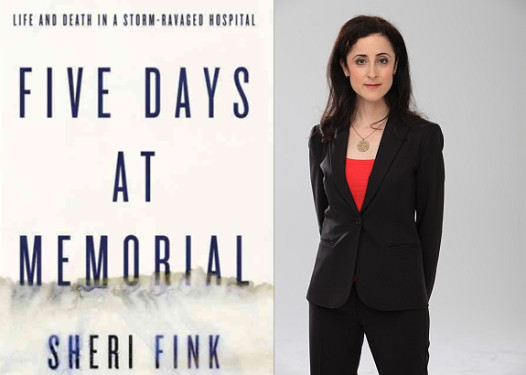 Author Sheri Fink will present her new book, Five Days at Memorial: Life and Death in a Storm-Ravaged Hospital, at 7 p.m. on Wednesday, Nov. 20, at the Jewish Community Center (5342 St. Charles Ave.).
Author Sheri Fink will present her new book, Five Days at Memorial: Life and Death in a Storm-Ravaged Hospital, at 7 p.m. on Wednesday, Nov. 20, at the Jewish Community Center (5342 St. Charles Ave.).
Five Days at Memorial provides readers an exhaustively researched and elaborately retold series of events that took place in post-Katrina Memorial Medical Center–commonly called Baptist Hospital–in New Orleans, where doctors were forced to make decisions as to which patients would live and die among the pandemonium. Months later, several health professionals faced criminal allegations that they deliberately injected numerous patients with drugs to hasten their deaths. The scenario involved, among other things, an “angel of death” said to have “stalked” Memorial’s halls, using lethal doses of morphine and other drugs to shoot up patients deemed too sick to evacuate. The case earned the attention of Anderson Cooper, 60 Minutes, and Nancy Grace, and inspired an episode of Boston Legal.
Fink, a physician and journalist, has won a Pulitzer Prize and a National Magazine Award, among many other accolades. This event, free and open to the public, is the featured event of the Jewish Community Center’s 2013 Jewish Book Festival.
From the Bookforum review of Five Days at Memorial:
This book is not a choose-your-own-adventure story. It is not an ethical puzzle. What’s important, it slowly emerges, is that despite Fink’s painstaking re-creation—based on five hundred interviews and mountains of documents—we weren’t there. We cannot know. Five Days is a seemingly conventional book, paced like a thriller, that is subtly dedicated to what John D’Agata, champion of the “lyric essay,” has described as the ever-shrinking “lifespan of a fact.” But where so many lyric essayists take fact’s half-life as a justification to fabricate symmetry, Fink, under the guise of third-person journalistic objectivity, drives us toward a kind of uncertainty so great that it’s revelatory. Five Days at Memorial is journalism in the same way that the observations Walt Whitman recorded in the “blood-smutch’d little note-books” he carried through Civil War hospital wards were journalism. Whitman’s method was subjectivity, and Fink’s is the obsessive accumulation of detail, but the result is oddly similar, sweeping us through an institution over and over again, making rounds like a doctor, alighting on this case or that, searching for answers and finding questions.
Read the entire review at Bookforum.
This article is reposted from Press Street: Room 220, a content partner of NolaVie.
 NOLAbeings Multimedia artist Claire Bangser created NOLAbeings as a portrait-based story project that marries...
NOLAbeings Multimedia artist Claire Bangser created NOLAbeings as a portrait-based story project that marries...  Voodoo in New Orleans: Reviving history: New Orleans fortune telling This article takes a deep dive into the history of Voodoo in New Orleans, its hybridization with Catholicism, and its present-day place in the city's culture. The author visits fortune-tellers in the French Quarter, using their guidance as a tool for introspection rather than a deterministic predictor of the future. Through her experiences in New Orleans, the author feels a mystical connection to both the past and the future.
Voodoo in New Orleans: Reviving history: New Orleans fortune telling This article takes a deep dive into the history of Voodoo in New Orleans, its hybridization with Catholicism, and its present-day place in the city's culture. The author visits fortune-tellers in the French Quarter, using their guidance as a tool for introspection rather than a deterministic predictor of the future. Through her experiences in New Orleans, the author feels a mystical connection to both the past and the future. 